Sergey Danilov
web developer at Fleetmatics
Angular 2.0 - first look
The Angular is dead,
long live the Angular!
History
ng-europe 2014
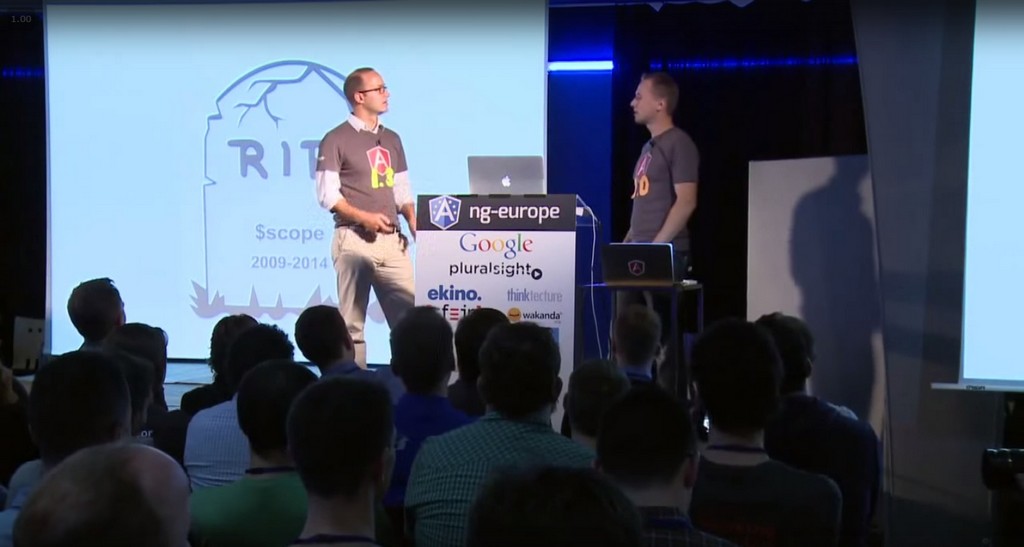
Let's kill everything
angular.module and jqLite
are killed as well
- Controllers are gone
- Directives are dead
- Rip $scope
Foundation Angular 2.0
AtScript (super set of ES6)
Annotations
Generic binding syntax
DI mechanism based on types
Everything is Component
// Annotation / decorators section
@Component({
selector: 'my-app'
})
@View({
template: '<h1>Hello {{ name }}</h1>'
})
// Component controller
class MyAppComponent {
name: string;
constructor() {
this.name = 'Alice';
}
}Latest news :)
Performance
and
Rendering
Deep Tree Benchmark: Render
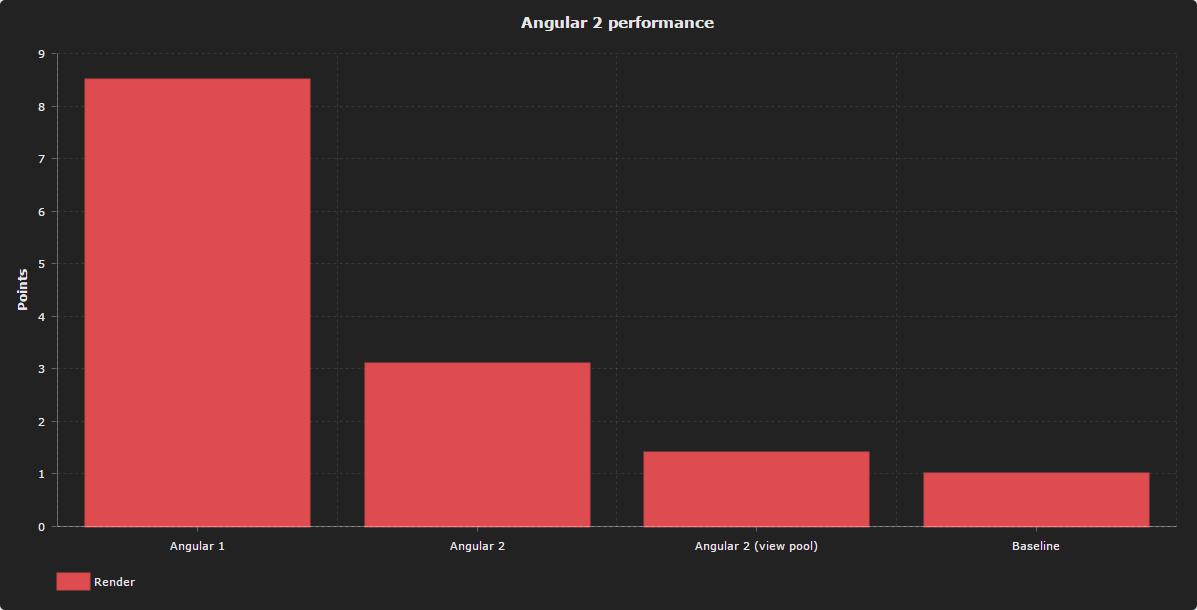
Deep Tree Benchmark: Memory
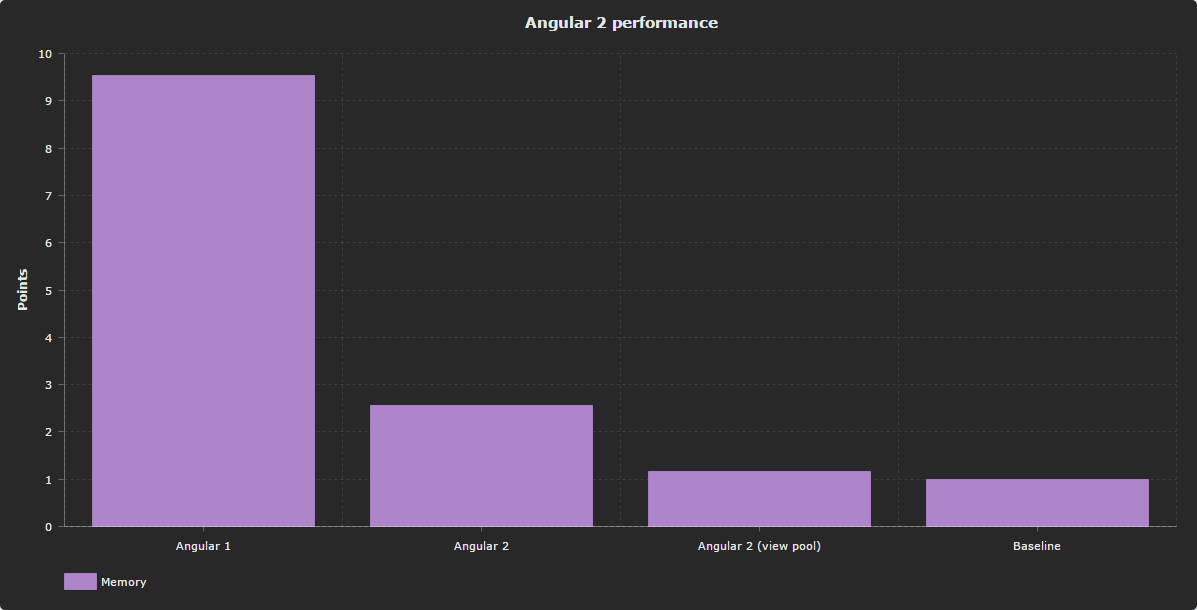
Angular 2 in a Web Worker
Main
Worker
Angular
DOM
Render
Angular
App
Render separation
Worker
Angular
Render
Angular
App



... like ReactNative
Server-side Angular
Faster Startup
SEO
Preview
New syntax in templates
more details on ng-conf 2015 (Misko Hevery)
Property bindings
<todo-cmp [model]="todoItem"></todo-cmp>Event bindings
<todo-cmp (complete)="onComplete()"></todo-cmp>@Component({
selector: 'todo-cmp',
events: ['complete']
})
class TodoCmp {
constructor() {
this.complete = new EventEmitter();
// EventEmitter is an implementation of both
// the observable and observer interfaces
}
onComplete() {
this.complete.next(); // this fires an event
}
}Two-way bindings
<input [ng-model]="todo.text" (ng-model)="todo.text=$event"></input>
<input [(ng-model)]="todo.text"></input>
or
@Directive({
selector: '[ng-model]',
properties: ['ngModel'],
events: ['ngModelChanged: ngModel'],
host: {
"[value]": 'ngModel',
"(input)": "ngModelChanged.next($event.target.value)"
}
})
class NgModelDirective {
ngModel:any; // stored value
ngModelChanged:EventEmitter; // an event emitter
}Templates, * and local vars
<todo-cmp *ng-for="#item of todos; #i=index" [model]="item" [index]="i"></todo-cmp>
<todo-cmp template="ng-for #item of items; #i=index" [model]="item" [index]="i"></todo-cmp>
this de-sugars it into
which de-sugars into
<template ng-for #item="$implicit" [ng-for-of]="items" #i="index">
<todo-cmp [model]="item" [index]="i"></todo-cmp>
</template>
Annotations / Decorators
import { Component, View } from 'angular2/angular2';
@Component({
selector: 'my-app'
})
@View({
template: '<h1>Hello world</h1>'
})
class MyAppComponent {
constructor() {
}
}Annotations
var MyAppComponent = (function () {
function MyAppComponent () {}
MyAppComponent.annotations = [
new Component({...}),
new View({...})
];
return MyAppComponent;
})();transpiler should know how transform it
Decorators
// A simple decorator
@annotation
class MyClass { }
function annotation(target) {
// Add a property on target
target.annotated = true;
}for now angular 2.0
(it seems from alpha 22)
use decoraters
and all transpilers has extensions for it or support it out of the box (Typescript 1.5)
Change Detection
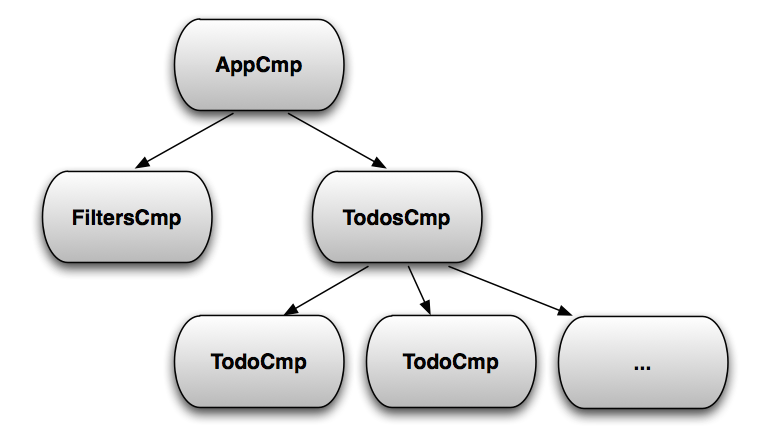
An Angular 2 application is a tree of components
An Angular 2 application is a reactive system
and it has tree of change detectors
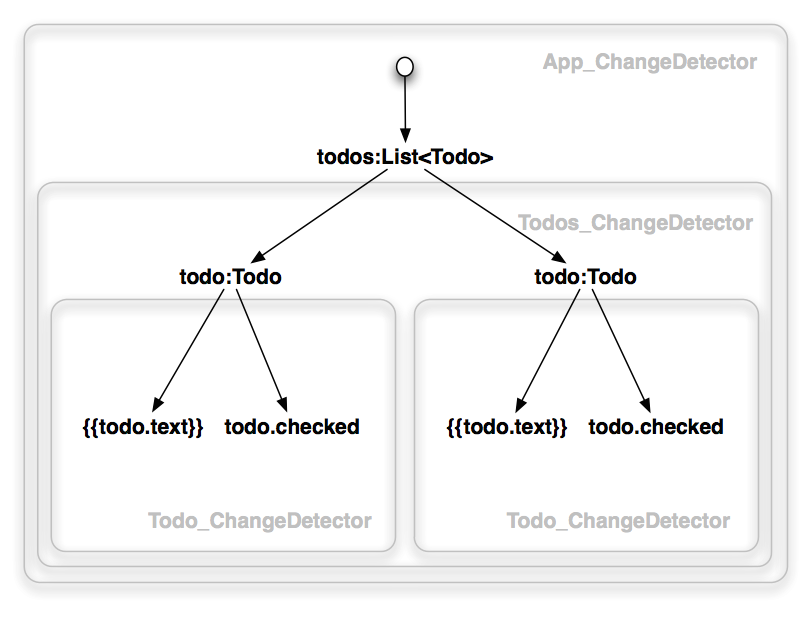
Strategies of optimizations
- Immutable objects
- Observable objects
Immutable objects
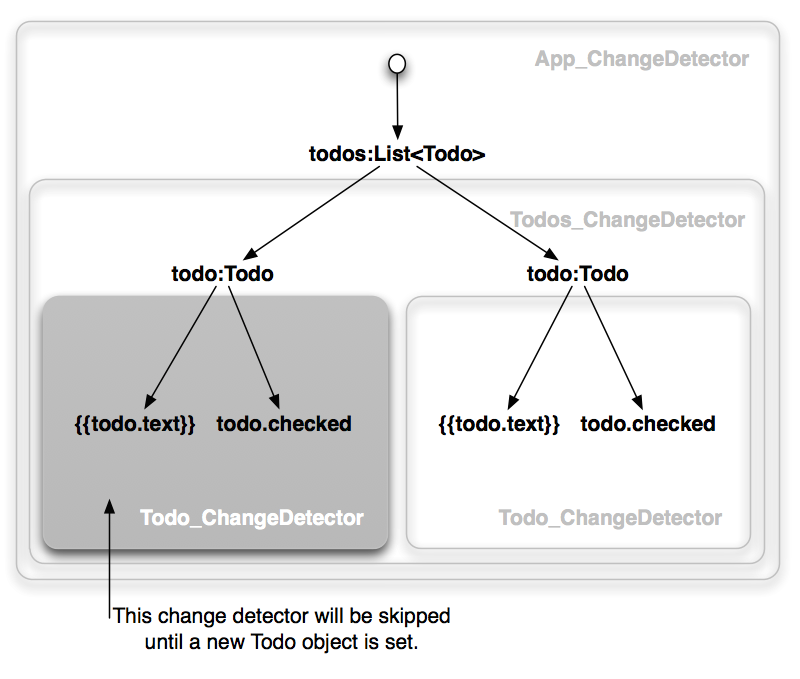
Disabled change detection
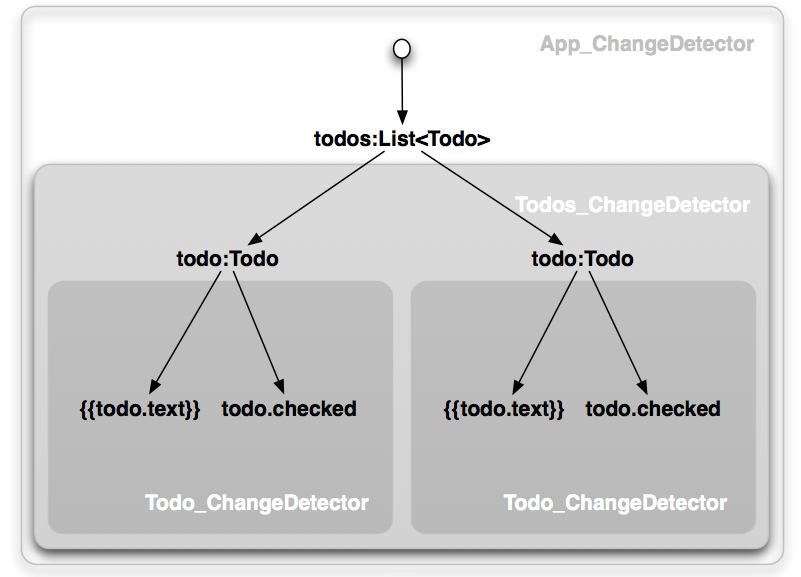
Setup change detection strategy
@Component({changeDetection:ON_PUSH})
class ImmutableTodoCmp {
todo:Todo;
}Observable objects
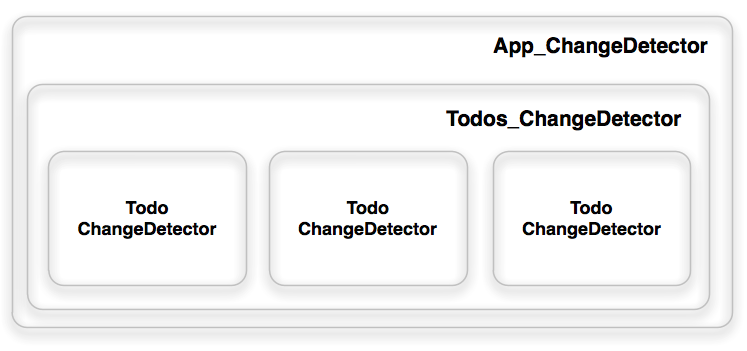
The first pass
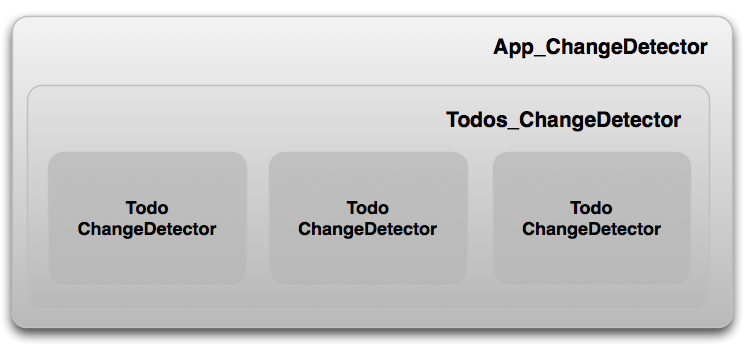
Fire an event
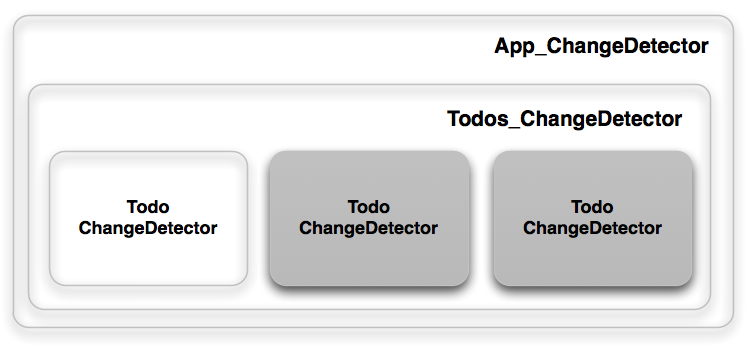
Next pass
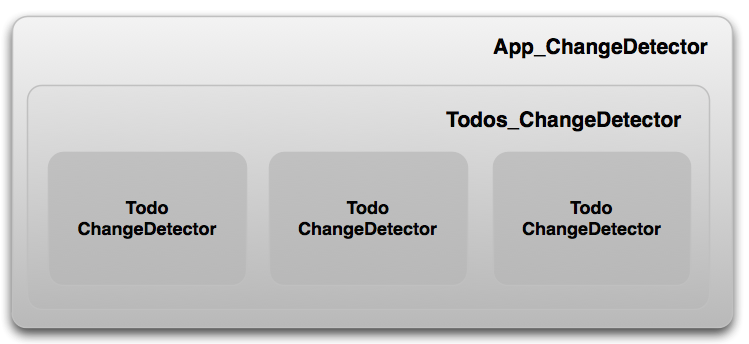
- App_ChangeDetector
- Todos_ChangeDetector
- the first Todo_ChangeDetector
Declaration
type ObservableTodo = Observable<Todo>;
type ObservableTodos = Observable<Array<ObservableTodo>>;Cooking Angular 1 for second version
angular
.module('app', [])
.controller('MyController', ['$scope',
function ($scope) {
// some methods
$scope.doSomething = function() { ... }
}
]);
<div ng-controller="MyController">
...
<button ng-click="doSomething()">Do It</button>
</div>"controller as" syntax
angular
.module('app', [])
.controller('MyController', ['$scope',
function ($scope) {
var vm = this;
// some methods
vm.doSomething = function() { ... }
}
]);
<div ng-controller="MyController as ctrl">
...
<button ng-click="ctrl.doSomething()">Do It</button>
</div>Using $inject and hoisting
angular
.module('app', [])
.controller('MyController', MyController);
MyController.$inject = ['$scope'];
function MyController($scope) {
var vm = this;
// some methods
vm.doSomething = function() { ... }
}
<div ng-controller="MyController as ctrl">
...
<button ng-click="ctrl.doSomething()">Do It</button>
</div>Independent declaration & ES6
import MyController from './my-controller.js'
angular
.module('app', [])
.controller('MyController', MyController);
class MyController {
constructor($scope) {
...
}
doSomething () { ... }
}
MyController.$inject = ['$scope'];
export default MyController;Real Angular 2 component from demo
@Component({
selector: 'todo-list',
properties: ['list']
})
@View({
templateUrl: 'src/components/todo-list.template.html',
directives: [NgFor, NgIf, NgModel, TodoItem]
})
class TodoList {
constructor(store){
this.store = store;
}
...
clearCompleted() {
this.store.clearCompletedItems();
}
}
TodoList.parameters = [[TodoStore]];
export default TodoListVanilla Angular 1

Angular 1 + ReactJS

Angular 1 + React vs Angular 2
Sources
- angular.io
- Thoughts on Angular 2 after ng-conf 2015
- Angular + React = Speed - Dave Smith
- The difference between Annotations and Decorators
- bit.ly/ngdocs (design docs, very deep information)
- Angular2 + JSPM cheat sheet (gist on GitHub)
- (David East) => { return ng2do_repo; }
- VICTOR SAVKIN's blog
Do you have any questions?
Demo repo: github.com/Pencroff/angular-2-first-look
Next Milestones
Finish Core
API Sugaring
Perf +
Docs
Migration support
Animate
Material Design
CLI
Server Render
Native
Web Workers
?
Local variables
<video-player #player></video-player>
<video-player var-player></video-player>is shugar sintax for
<button (click)="player.pause()">Pause</button>